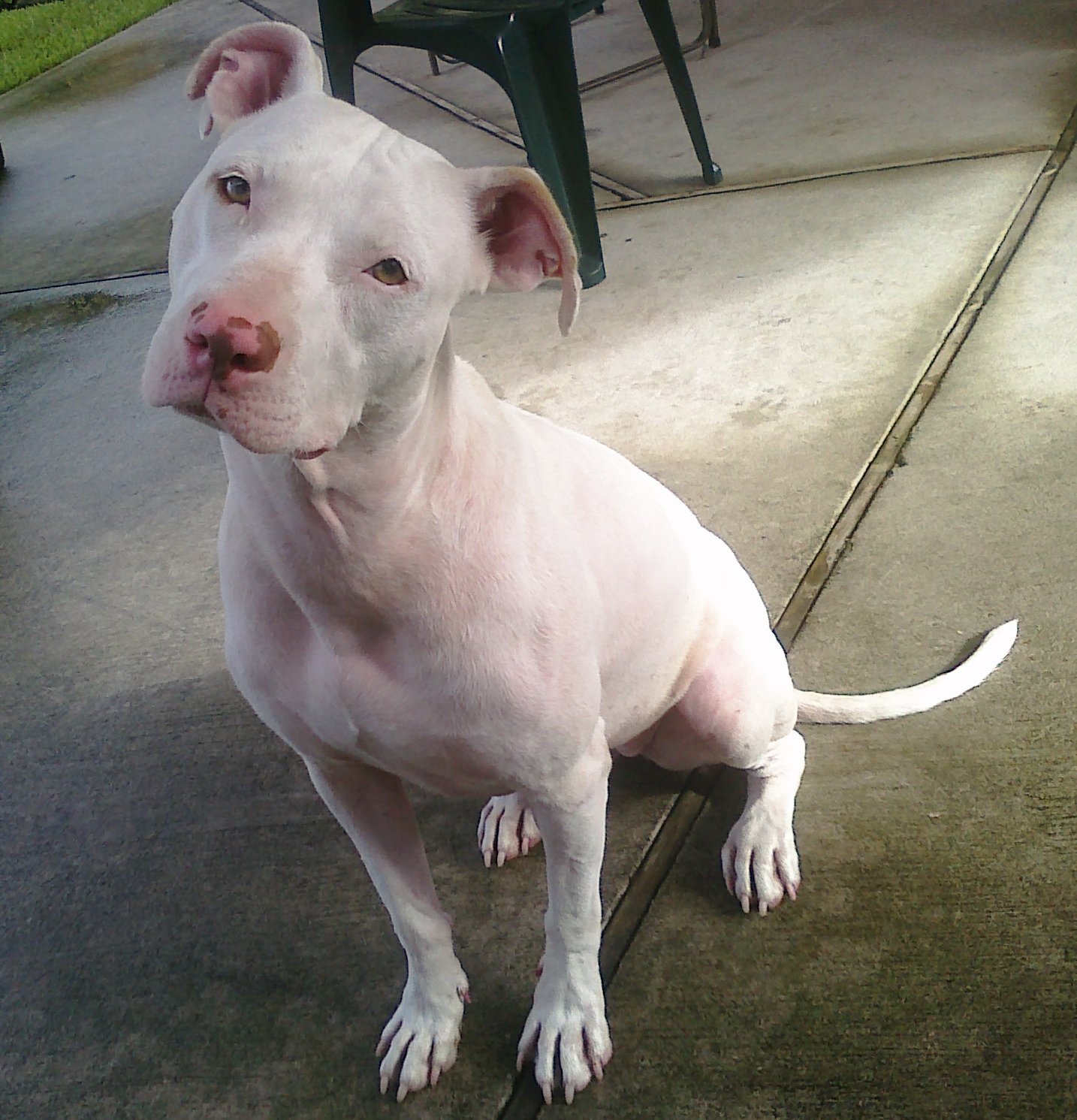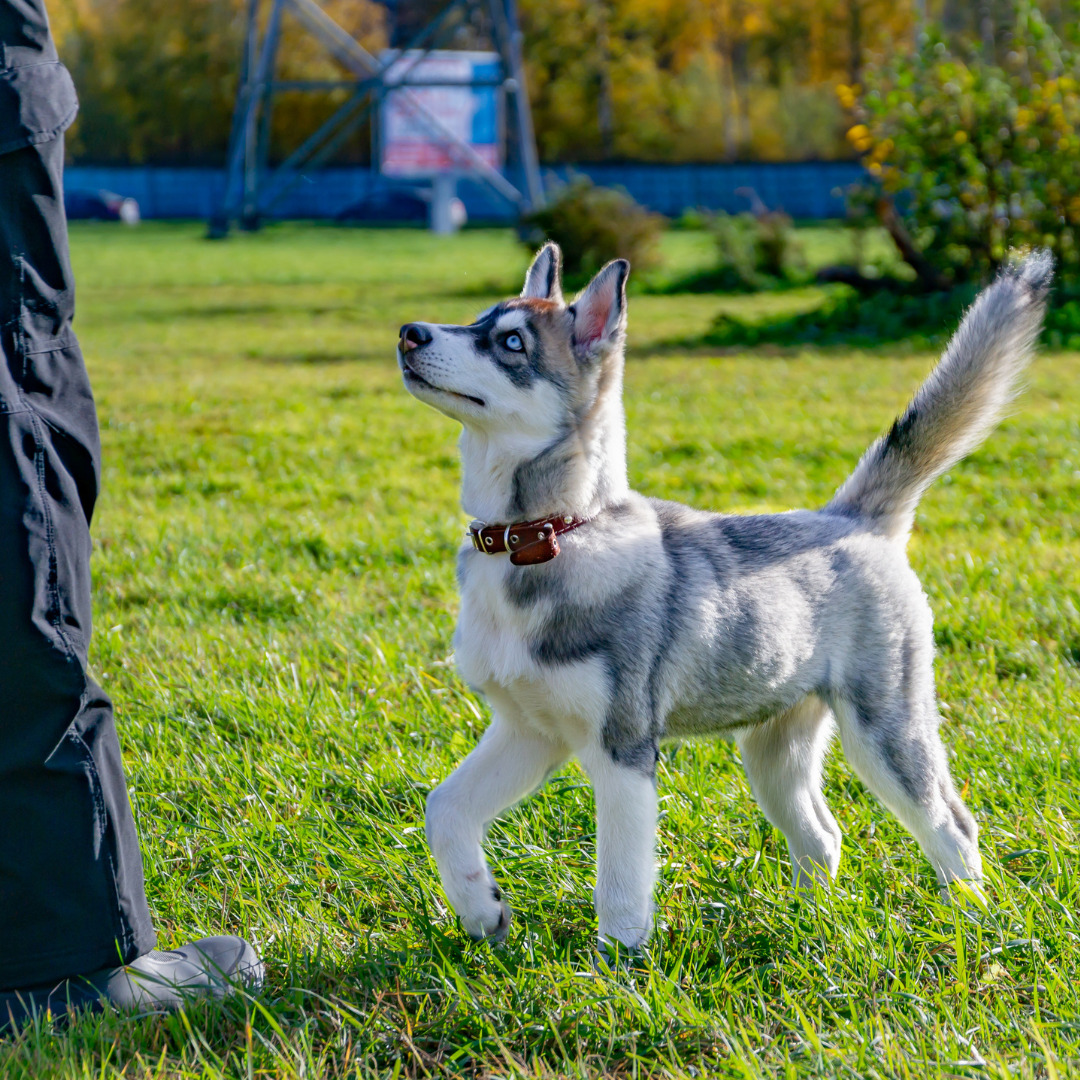White Pitbulls are medium-sized dogs with a striking white coat. They are 17 to 19 inches tall and weigh 40 to 70 pounds. Originally from the Bull-and-terrier breed in the British Isles, they were used in dogfighting. Known for their loyalty, confidence, and friendliness, these intelligent dogs make excellent family pets. Proper training, socialization, and care are crucial for their well-being. If you want to learn more about the White Pitbull breed, continue exploring their characteristics, history, temperament, and care requirements.
Breed Overview
White Pitbulls, a medium-sized dog breed known for their distinctive white coat color, stand at 17 to 19 inches in height and weigh between 40 to 70 pounds. These dogs have a smooth, short coat that sheds moderately, along with broad heads and defined jaws that give them a powerful and muscular appearance. Their eyes are commonly blue or light brown, adding to their striking look.
Originating from the Bull-and-terrier breed in the British Isles, Pitbulls made their way to America around 1850, initially used in dogfighting. Despite a decline in popularity post-World War II due to the introduction of other breeds, they have since become recognized for their intelligence, friendliness, and confidence as noted by the American Kennel Club.
White Pitbulls are loyal and devoted companions, known for their suitability in active households with or without children. Regular exercise, training, and socialization are key to ensuring they thrive as part of a family unit.
Characteristics of the white pitbull
Originating from the historical Bull-and-terrier breed in the British Isles, the characteristics of the white Pitbull encompass a unique blend of physical attributes and temperament traits that distinguish this medium-sized dog breed.
White Pitbulls typically stand between 17 to 19 inches, boasting a smooth, short coat that sheds moderately. Their broad heads and defined jaws portray a powerful and muscular appearance, complemented by eyes that are commonly blue or light brown.
Known for their intelligence and confidence, Pitbulls are described as friendly and loyal companions by the American Kennel Club. These dogs are devoted to their families and are not territorial, making them excellent family pets.
While they are good with children, Pitbulls can be energetic and require regular exercise. Proper training and socialization are essential for shaping their well-rounded personalities, highlighting the importance of early and consistent guidance for this beloved breed.
History of the white pitbull
The lineage of the white Pitbull traces back to the historical roots of the Bull-and-terrier breed in the British Isles. Originating in the 1800s, these dogs were created by crossing the Old English Terrier with the Old English Bulldog. Initially, they were utilized for activities such as baiting bears and bulls, dogfighting, and rat-catching. White Pitbulls were not commonly seen and were sometimes even considered a distinct breed. Their popularity in the United States grew notably through immigrants.
While historically associated with criminal dogfighting, today, they primarily serve as companions and working dogs.
The white Pitbull’s unique history and origin have shaped their characteristics and reputation. Their distinctive appearance, often linked to genetic interference causing a white coat, quickly garnered attention and popularity. Despite being rare and more prone to deafness, these dogs are highly sought after for their mesmerizing snowy appearance. While not formally recognized due to variations like albinism and merle, the breed standard aims to uphold quality and purity in these remarkable dogs.
White pitbull Temperament
Characterized by a blend of loyalty and vigor, the temperament of the white Pitbull reflects a balance of admirable traits. White Pitbulls are known for their loyalty, affection, and protective nature towards their families. They are highly energetic dogs that require regular exercise to prevent boredom and destructive behaviors. When properly socialized and trained, they can be friendly and gentle companions. Here is a breakdown of the white Pitbull temperament:
| Trait | Description | Example |
|---|---|---|
| Loyalty | Devoted and protective towards their family members | Always staying by your side |
| Playfulness | Energetic and enjoys interactive playtime | Fetching a ball in the yard |
| Confidence | Self-assured and bold in various situations | Approaching new environments with ease |
Understanding and catering to the white Pitbull’s temperament is essential for maintaining a harmonious relationship with this breed. Proper training, socialization, and regular exercise are key components in nurturing a well-rounded and happy white Pitbull.
Diet and Nutrition
When considering the health and well-being of white Pitbulls, a crucial aspect to focus on is their diet and nutrition. A balanced diet is essential to ensure these medium-sized dogs, known for their strength and agility, maintain optimal health.
White Pitbulls should be fed high-quality dog food that is appropriate for their age, size, and activity level. Protein-rich diets are beneficial for muscle development, while essential vitamins and minerals support overall well-being. It’s important to monitor their caloric intake to prevent obesity, a common issue in the breed.
Additionally, providing fresh water at all times is crucial to prevent dehydration, especially during hot weather or after physical activity. Regular feeding schedules and portion control can help regulate their weight and digestion. Consulting with a veterinarian to determine the best diet plan for your white Pitbull is recommended to ensure they receive the necessary nutrients for a long and healthy life.
Common Health Problems
One of the primary concerns for white Pitbulls is the prevalence of common health problems. While Pitbulls are generally healthy due to being bred for practical purposes, there are still some issues that commonly affect this breed.
Allergies are a common health problem in Pitbulls, often related to food and necessitating veterinary assistance for proper management. Additionally, urinary tract infections can be somewhat common in Pitbulls and should be promptly addressed to prevent complications.
To mitigate genetic health issues, adopting from reputable breeders who conduct health testing is advisable. Regular vet check-ups and proper nutrition are also essential for maintaining the overall health and well-being of white Pitbulls.
How to to Get a white pitbull puppies?
How can one responsibly acquire white Pitbull puppies?
When looking to bring a white Pitbull puppy into your home, it is essential to prioritize responsible breeding practices. Begin by researching reputable breeders who prioritize the health and well-being of their dogs. Look for breeders who conduct health testing on their breeding stock to ensure genetic conditions are minimized. Visiting the breeder’s facility is crucial to assess the living conditions of the dogs and puppies. Ask to see health clearances and certifications to validate the breeding program’s quality.
Another option is to consider adopting from rescue organizations or shelters that may have white Pitbull puppies available for adoption. This not only provides a loving home for a puppy in need but also helps combat the issue of pet overpopulation.
Remember that acquiring a white Pitbull puppy is a long-term commitment, requiring time, effort, and resources to ensure the well-being of the dog throughout its life. By choosing a reputable breeder or adopting from a shelter, you can welcome a white Pitbull puppy into your family responsibly and ethically.
What’s the Price of white pitbull?
The cost of acquiring a white Pitbull can vary significantly depending on factors such as the dog’s lineage, breeding standards, and availability in the market. On average, a white Pitbull puppy from a reputable breeder can cost anywhere between $500 to $2000. However, prices can go even higher for Pitbulls with exceptional lineage or show potential.
Rescue organizations or shelters may offer white Pitbulls for adoption at a lower cost, typically ranging from $50 to $200, which can be a more affordable option for those looking to provide a loving home to a dog in need. It is essential to consider additional expenses such as vaccinations, microchipping, spaying or neutering, and ongoing healthcare when budgeting for a white Pitbull.
Potential buyers should be cautious of unusually low prices, as they may indicate poor breeding practices or health concerns, which could result in higher costs in the long run.
Conclusion
In conclusion, the White Pitbull breed is known for its medium size, muscular build, intelligence, loyalty, and friendly nature. They make excellent family pets when properly trained and socialized.
Health considerations, grooming needs, and unique traits of White Pitbulls are important factors to consider for prospective owners.
With their high energy and easy-to-train nature, White Pitbulls can be a great addition to a loving home.




